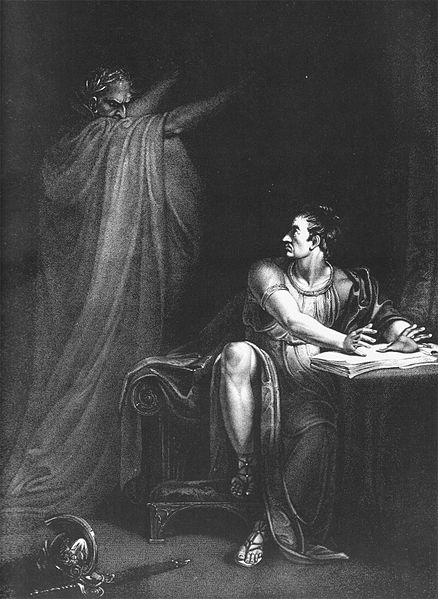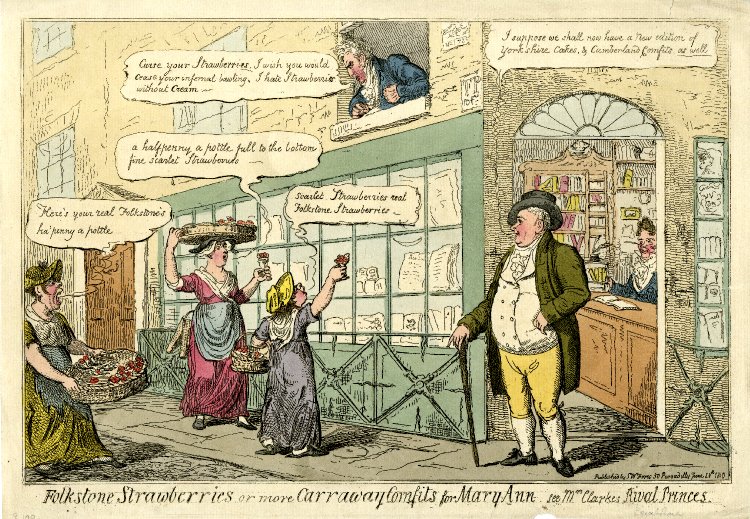Hi everyone! I’m reposting an old History Hoydens post today, about Regency ghosts. When I wrote it, I was working on a book with a ghost character. The book is now under my bed, but who knows what the future will bring? I still think this stuff is fascinating. The block quotes are from The Haunted: a Social History of Ghosts by Owen Davies.
The character I imagined was a murder victim seeking justice (or maybe vengeance…he wasn’t entirely a nice ghost), which has been a popular kind of ghost over the centuries—so popular, in fact, that murder investigations have been opened because of ghost sightings, up through the early part of the eighteenth century. In one case in 1660, a Westmoreland magistrate investigated the death of Robert Parkin because of a report that Robert’s ghost had appeared to a man in the parish church crying “I am murdered I am murdered I am murdered.”
In 1728, a Dorset coroner exhumed a body because of several sightings of the boy’s ghost. In this case the ghost didn’t even speak—its appearance was enough to indicated foul play, despite no previous suspicion about his death. Upon examining the body, the coroner decided he had really been murdered.
Murder victims sometimes haunted their killers: a servant who had killed his master and gotten clean away to Ireland was driven to turn himself in by a headless ghost who appeared to him every night demanding “Wilt thou yet confess?” Sometimes they haunted other acquaintances.
One of the most upsetting incidents described in the book is this one:
The astrologer and occultist John Heydon (1629-c.1670) recounted how one of his mother’s maids was pulled out of her bed one night by the ghost of a lover named John Stringer, who had recently been murdered by a jealous admirer. Despite three doors leading to her bedroom being locked, the maid ‘had the right side of her haire and headclothes clean shaved or cut away’ by Stringer’s ghost.
That poor woman! Whether you believe in ghosts, or whether you think she imagined the ghost out of guilt and shaved her own hair, it’s an awful story. I hope the “jealous admirer” was prosecuted, and didn’t get to continue stalking and attacking her and her loved ones.
Sometimes ghosts appeared to strangers at the site of their hidden graves. This tied in with another ghost tradition, that souls who didn’t receive Christian burial would walk until their bodies were found and interred in consecrated ground. In 1806, in a town near Manchester, the townsfolk drained a deep pool after a recently missing man’s ghost repeatedly appeared over it at midnight, leading to suspicion he had been murdered. His body was actually found at the bottom, although the evidence indicated he had drowned accidentally. (Not…really sure what this “evidence” would have consisted of at the time. Since writing the original post I’ve read a lot about Elma Sands’s 1800 murder in New York, which also involved the body spending time in water, and there was more or less a complete lack of contemporary forensic knowledge displayed in the autopsy testimony by prominent doctors. So I guess what this really means is that the coroner’s jury ruled for accidental death.)
Francis Grose [in his 1787 A Provincial Glossary, with a Collection of Local Proverbs, and Popular Superstitions] wondered why the ghosts of those murdered did not go straight to the nearest justice of the peace, rather than hang about their burial place frightening passers-by. ‘Ghosts have undoubtedly forms and customs peculiar to themselves,’ he concluded. [Google books link for Grose]
Ghosts historically have not talked much, although apparently they talked more before the Victorian era!

“Brutus and the Ghost of Caesar.” Copperplate engraving by Edward Scriven from a painting by Richard Westall. London, 1802. Image via Wikimedia Commons.
Completely silent ghosts became the norm to a much greater extent over the course of the nineteenth century. Generally ghosts who did speak were wrong-righting ghosts. (Although there were exceptions! In 1706 Mr. Shaw, a fellow of St John’s College, Oxford, chatted with the ghost of a dead colleague for two hours before receiving his warning of untimely death.) Murder victims were the most common. (Conflicts over inheritance were also a big one: “Mother’s ghost appeared to me and she says I get the antique dining set!”)
Ebenezer Sibly, eighteenth century writer on astrology and the occult (and huge racist), insisted that only murder victims could speak (and possibly only those who had been killed in “circumstances uncommonly horrid and execrable”), because the traumatizing memory did “more powerfully operate upon the faculties of the apparition, so as to enable it to frame the similitude of a voice, so as to discover the fact, and give some leading clue to detect and punish the wicked perpetrator.”
What’s your favorite ghost story? (Either a famous one, or one that happened to you or someone you know…)





